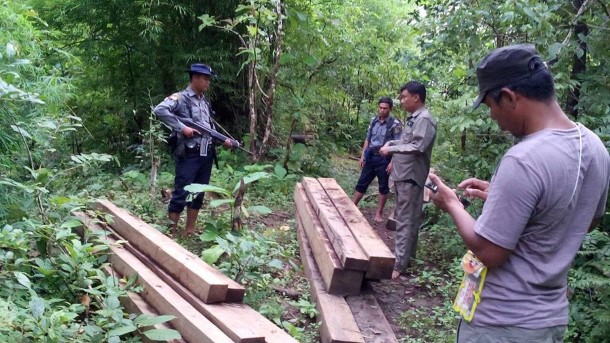Forestry police numbering 215 have been deployed since Sept. 1 across multiple states and divisions, to protect forestry department personnel in a continued crackdown on illegal logging, which has previously drawn violent reprisals from criminal gangs.
The forestry police was established in 2013 as a division of Burma’s Police Force, under the military-controlled Ministry of Home Affairs.
Their new deployment areas are: Dekkhinathiri District in Naypyidaw; Rangoon’s Northern District; Pyay, Taungoo, Tharrawaddy and Pegu districts in Pegu Division; Shwebo, Monywa and Katha districts in Sagaing Division; Pakokku and Gangaw districts in Magwe Division; Taunggyi and Lashio districts in Shan State; and Pathein District in Irrawaddy Division, according to the Ministry of Natural Resources and Environmental Conservation.
U Myo Min, a director at the ministry, said they would cooperate with the Burma Army, as well as with other government departments, in the illegal logging crackdown.
U Sithu Lwin, a retired forestry department official, called the fresh deployment of forestry police “a good move,” but thought that, if conventional forestry officers were allowed to carry guns—as they were before 1988—the extra expense would be saved.
The ministry has called on the President to impose a halt on the logging of teak and other hardwoods starting from this fiscal year, ending March 2017, until further notice. Also starting this fiscal year, logging in the Pegu mountain range of central Burma will undergo a ten-year ban.
In Parliament on Wednesday, the minister U Ohn Win said they were taking a tough line on illegal logging.
U Ohn Win admitted to Parliament that a truck carrying 15 tons of smuggled logs crosses the border into China every seven minutes on average.
“I am dismayed to hear that. Our country has lost a lot of its resources since the military took administrative power. These things need to be changed now,” said Sithu Lwin.
Lawmaker U Aung Kyaw Kyaw Oo of Rangoon’s Hlaing Township quoted in Parliament a 2015 report by the United Nations Food and Agricultural Organization, which ranks Burma third among countries for its rate of deforestation. He alleged that sections of the Burma Army and of ethnic armed groups, as well as forestry department personnel, are involved in illegal logging.
Since the new government took office in April, 19,108 tons of smuggled teak and other hardwoods, and 992 units of machinery used in illegal logging, had been seized by the end of August, with 3,316 smugglers arrested. According to ministry figures, 631,000 tons of smuggled teak and hardwoods, and 13,956 units of machinery, have been seized over the past 16 years, with 100,943 smugglers arrested.
Burma lost an average of 1.7 percent of its forests annually from 2010-15, leaving total forest cover at 45 percent (around 29 million hectares), according to the UN Food and Agriculture Organization. Fifteen years before, this stood at 65 percent, the agency said.
Since 2014, the legal logging sector—whose methods, under the state-owned Myanmar Timber Enterprise, have received a large part of the blame for Burma’s deforestation—has been restricted according to an annual quota. Log exports were then suspended from April the same year.
Translated from Burmese by Thet Ko Ko.

















